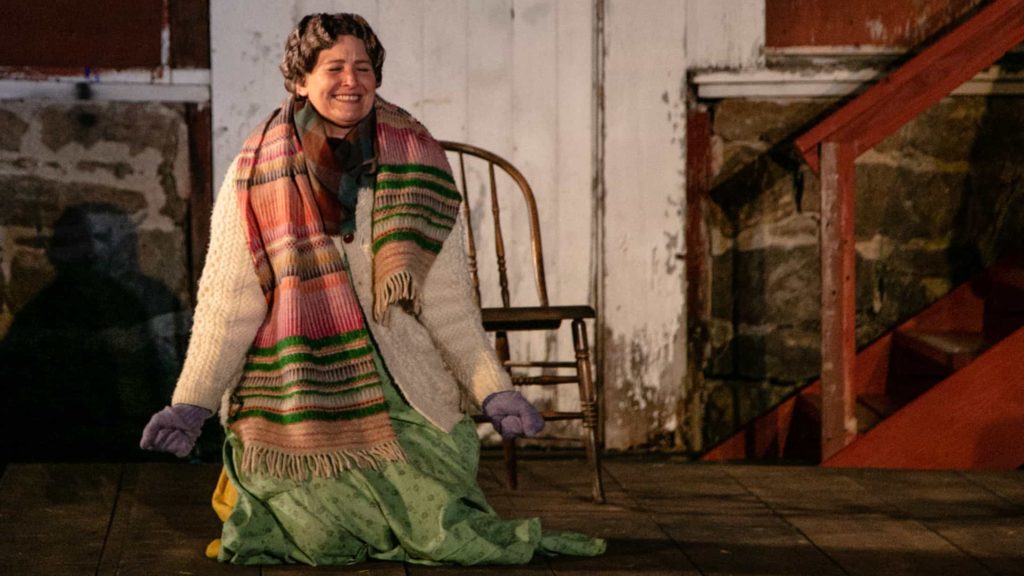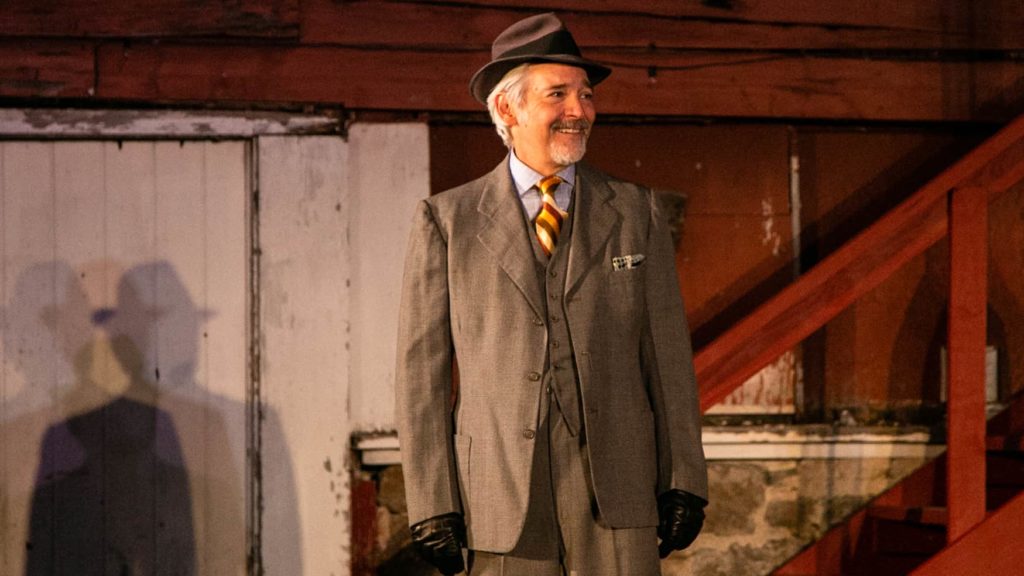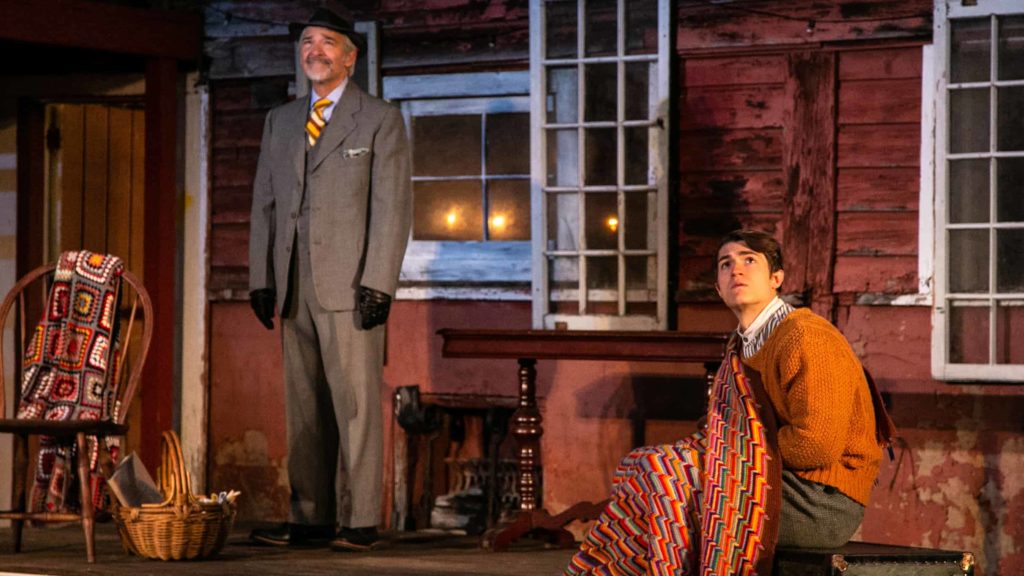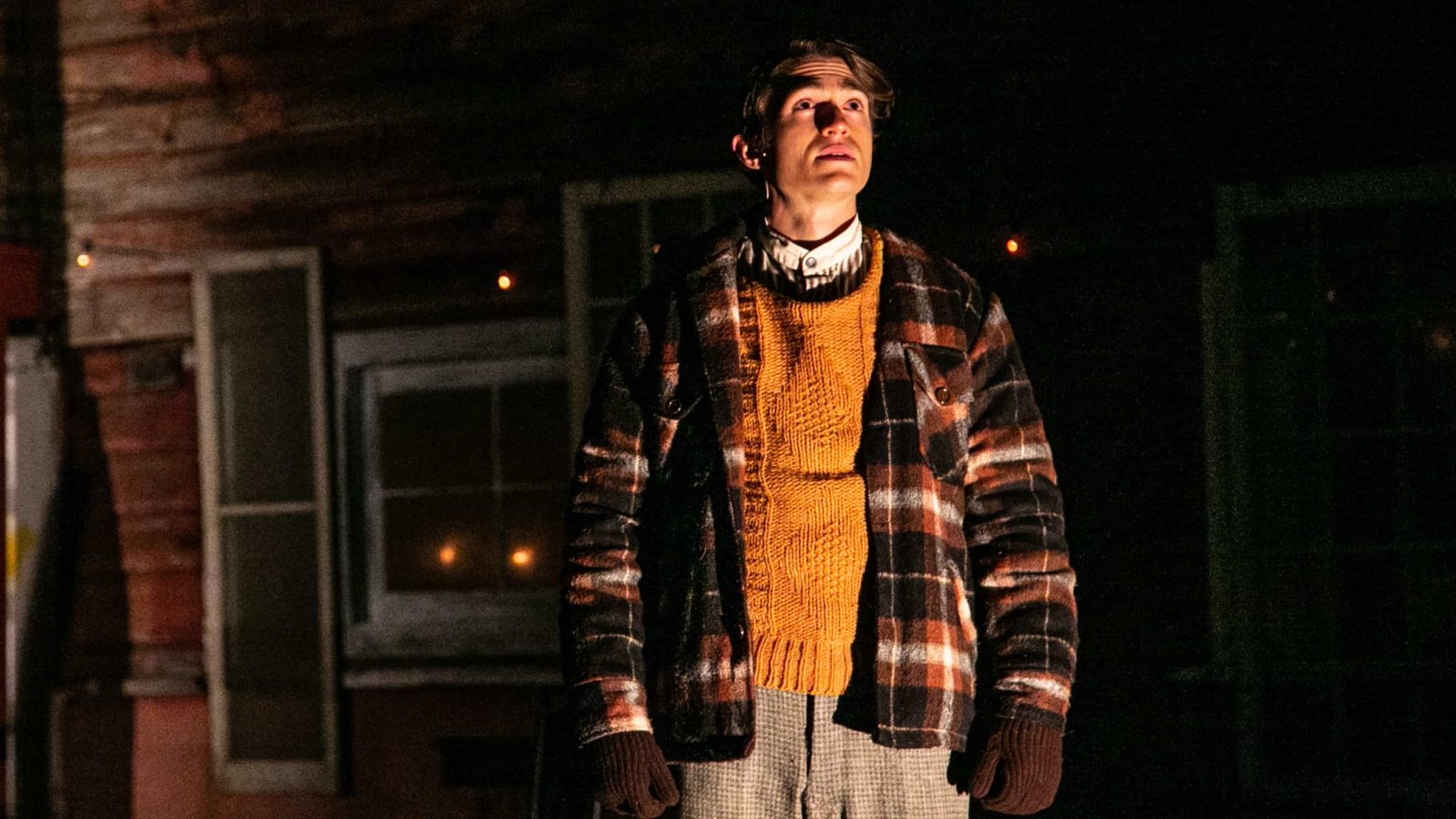A seven-year-old boy and woman with her white hair cut short are finishing breakfast in the kitchen by an iron stove.
“‘Oh my,’ she exclaims, her breath smoking the windowpane, ‘it’s fruitcake weather!’”
It’s 1936 in a small town in Alabama, deep in the Depression, and they have prepared for months for this morning. They have saved pennies from summer jobs to buy butter and sugar. They will take a battered pram to pick pecans from the trees in the garden. They will make 30 fruit cakes — and send them around the world.
Truman Capote remembers a coming of winter morning more than 80 years ago, and Berkshire Theatre Group is bringing it to life in an outdoor performance of Holiday Memories. The show will run through December 20, and on their campus in Stockbridge, and it comes in two short acts, with a break to warm up with hot drinks and seasonal fare. They encourage the audience to dress warmly.
Capote as a boy would have understood. He knew the feeling of cold feet and exhilaration when he and his cousin hiked through fields still rimed with frost and crossed two creeks to find holly and cut down a tree twice his height, to haul home in their improvised buggy.
The play is adapted from Truman’s stories of his own childhood. As a boy he lived with distant cousins, and one became his surrogate mother, companion, partner in mischief and close friend.
He appears here on stage at two different times in his life. David Adkins plays a mature and reflective Capote, looking across time as Tim Jones plays Buddy, Capote as a boy and a young man. And this performance has made a rare choice, Adkins said — they can see one another.
Buddy becomes both an active character and a second narrator, Jones said. As he plunges into the story, his impressions can color Truman’s recollections of his childhood.
‘As an adult we may see the highlights, what we think are the important points, but Buddy is a child, and for him the important parts are what bring him joy.’ — Tim Jones
“As an adult we may see the highlights, what we think are the important points,” he said, “but Buddy is a child, and for him the important parts are what bring him joy.”
It is powerful, he said, to hear Buddy’s voice supplementing Capote’s narrative with his own about small details that make children, children.
He shares those quick enthusiasms with his cousin. Corinna May plays Sook Faulk, the woman who has raised him. She is Buddy’s best friend.
She can coax hummingbirds to sit on her finger, he says in the story. She will tell ghost stories, and make kites and fishing poles, and set up a museum in the backyard woodshed. And she knows where her father used to harvest Christmas trees half a century ago.
“Her face is remarkable,” Capote recalls, “not unlike Lincoln’s, craggy like that, and tinted by sun and wind, but it is delicate too, finely boned, and her eyes are sherry colored …”
And she walks into the world with an open curiosity.
‘When Buddy comes home from school they hunt mushrooms, they collect ferns in the woods, they have pillow fights … In a way she is able to take in the world.’ — Corinna May

Corinna May performs as Sook Faulk, Truman Capote's 60-year-old cousin and friend, in A Holiday Memory. Press photo courtesy of Berkshire Theatre Group.
“What a joy to play someone who lived in many ways in a simpler time,” May said. “She has a whole house she looks after — everyone else has a job. When Buddy comes home from school they hunt mushrooms, they collect ferns in the woods, they have pillow fights … In a way she is able to take in the world.
“And then you add in that she is kind of a recluse. As a child she had an illness. It isolated her; she really didn’t go to school. In a way she lives in a small world and in a huge world. She’s very attuned to the natural world. She’s very attuned to the relationship between herself and Buddy. how she interacts with Buddy, and she tries not to interact too much with grownups. … She has the latitude to live this joyful life.”
“She’s the freest person of us all,” Adkins agreed.
Others in the family and the town live hemmed in by the social construction that surrounds them, he said.
Daniel Garrity and Isadora Duncan fill many roles as the story unfolds — the bully Buddy faces in school, a bootlegger, an affluent mill owner’s wife — bringing a different energy in each encounter, and creating a sense of the town and community.
“I feel as though on stage with a cast of 20 people,” May said.
Duncan enjoys embodying many people and perspectives in quick strokes.
“That’s the work that Danny and I do, to flesh them out,” she said.
Duncan also acts as the movement director
“Since we’re dealing with such simplicity and dealing with distance the pandemic has created between all of us, and they’re all such physical performers to start with, we’re going deep with the details of the physical life of each one of them and looking at how we can tell the story not just through the gorgeous words … but through those finer details in the body.”
Adkins finds momentum in the beauty of the language Capote unearths. And May finds it in the pressures and
people in a small town in a hard time, sometimes hungry, sometimes afraid, and sometimes generous even when they seem powerless.
‘He is speaking from his heart about his relationships with the world, and he wants us to feel it. He wants us to see it and to be walking through the woods, breathing the perfume of the trees.’ — Corinna May
“Capote is in relationship vividly and viscerally with the people around him,” she said — “Sook, his friends, his tormenters, the natural world. … He is speaking from his heart about his relationships with the world, and he wants us to feel it. He wants us to see it and to be walking through the woods, breathing the perfume of the trees. …
“And how much fun it is to bring these things to life in a theatrical way — it can be fanciful, sparkling.”
And audiences play along, Adkins said, the way children naturally do.
“A stick can become a sword in an instant.”
It’s the same spirit that moves Buddy and Sook to bake 31 cakes and send them across the country to people who catch their interest — a traveling knife-grinder, the bus driver to Mobile, a California couple who stopped one day when their car broke down, a Baptist couple who went to Borneo — Eleanor Roosevelt. They have a scrapbook of letters of thanks.
“Resilience is what it’s all about,” Adkins said.
Storytelling is the art of making sense out of chaos, he said.
“It’s a beautiful story, with moments of triumphs over moments of adversity. And that’s what we’re doing now at Berkshire Theatre Group, and what we were doing with Godspell in August.”

David Adkins plays Truman Capote looking back to his boyhood in A Holiday Memory. Press photo courtesy of Berkshire Theatre Group.
It is a story about how much a human connection can transform, as people hold each other and encourage each other and kindle energy between them.
“Buddy make’s Sook’s life possible,” May said. “If it weren’t for Buddy, she wouldn’t be out gathering mushrooms and looking for ferns. His life and presence sparks hers. She learns from him because he draws things out of her. They have been together since he was a toddler.”
For a seven year old boy growing up in a closed and isolated place, Sook gives Buddy a wider world.
Jones considered how it would feel to Buddy, intelligent and bullied, growing up in this country town with barely a voice from the world beyond it. Sook has never seen a movie, read a book beyond the Bible, eaten in a restaurant or gone more than five miles from home.
“He definitely looks at the world around him,” Jones said, “and he may be innocent, but that doesn’t mean he’s not smart. He sees everything about his family. He understands that his cousins are unmarried, and though they’re employed, his uncle’s fiancée declined an engagement on seeing what she would be walking into. He sees that and understands it.
‘He understands the difficulty Depression has inflicted on the people around him and the situation they happen to be in. And he derives joy from the things he and Sook get to do out of happiness, and out of creativity, and out of love.’
“Despite the torment he has at school … despite the things he actively recognizes challenges and still chooses to embrace joy and chooses to derive it from his best friend, this dear, dear person to him. … No matter how challenging his life outside of that relationship becomes, or even within it, there always comes the chance to choose love, and across the board he does that. He looks at the opportunity to reinforce their relationship.”
He sees the straits they are in, when they need money to buy whiskey (for the cakes) and they’re saving pennies from killing thousands of flies, so they can afford to do something for other people.
“They’re putting in this work through the year so that once a year they can bake a series of fruit cakes and then give them to other people.
“He understands the difficulty Depression has inflicted on the people around him and the situation they happen to be in. And he derives joy from the things he and Sook get to do out of happiness, and out of creativity and out of love.”
Buddy and Sook give away all of these 31 cakes. Jones wondered at that generosity. Having spent a year saving up for the ingredients, and for the postage to mail them, they send every one away.
“That’s the most interesting part,” Jones said. “When you think of the challenges something out of people’s control like the Depression might inflict on them, they still navigate within that and adapt to it in a way that still allows them to do things for other people. And I think that is one of the most interesting parts of this story, especially as it relates to what’s happening right now.
“It’s not a matter of whether people are adaptable. People are incredibly adaptable. We see them look at a problem … and the first thing we do is think about how they are going to solve it.
“And it’s not a matter of whether we’re going to solve our own problems but a matter of, do we accept those challenges for the sake of those around us, and not just so that we can get through what’s happening in our social lives and in our professional lives and these immense challenges we have never faced before. We can certainly do them for our own sake. But I think it’s important to look at people saving money over the course of an entire year and then spending all of it to send a gift to people they’ve never met. It’s not just about trying to salvage joy for ourselves. It’s about sharing it with other people. And I think that’s important when we look at the parallels we can draw between a time like the Great Depression, an incredibly challenging time in American life, to now.

David Adkins and Tim Jones look across time as Truman capote in A Holiday Memory. Press photo courtesy of Berkshire Theatre Group.
The joy is in the giving, May agreed, and the time they put into the work makes the pleasure of giving greater.
“And choosing joy,” she said, “… It is a choice, and it’s a lot harder for some people to be able to make it. Some people have circumstances that can make it seem impossible, and I don’t mean to minimize what so many people in the world are up against. But … we continually tell each other the story of choosing joy. It must have something to do with our well-being.”
She feels the experience of theater encouraging that kind of joy.
“You tell the audience this is the ride we’re on,” she said, “and they say ‘Great. We’re in Denmark and it’s the 9th-century? I’m in. We’re in the South? Great. We’re switching place and time, going back and forth? Great — I’m in. Audiences come in wanting to use their imaginations. Because who hasn’t as a kid said ‘you’re the dragon, and that’s the fort, and that’s molten lava …’ We’re all ready to step in to that ride, given the invitation.
“That’s one of the reasons I go to the theater, because I want to be transported — I want to take that ride.”
Come prepared to laugh, she said. Come prepared to marvel.

